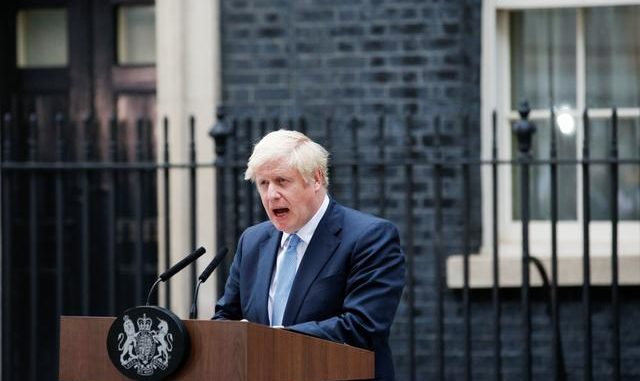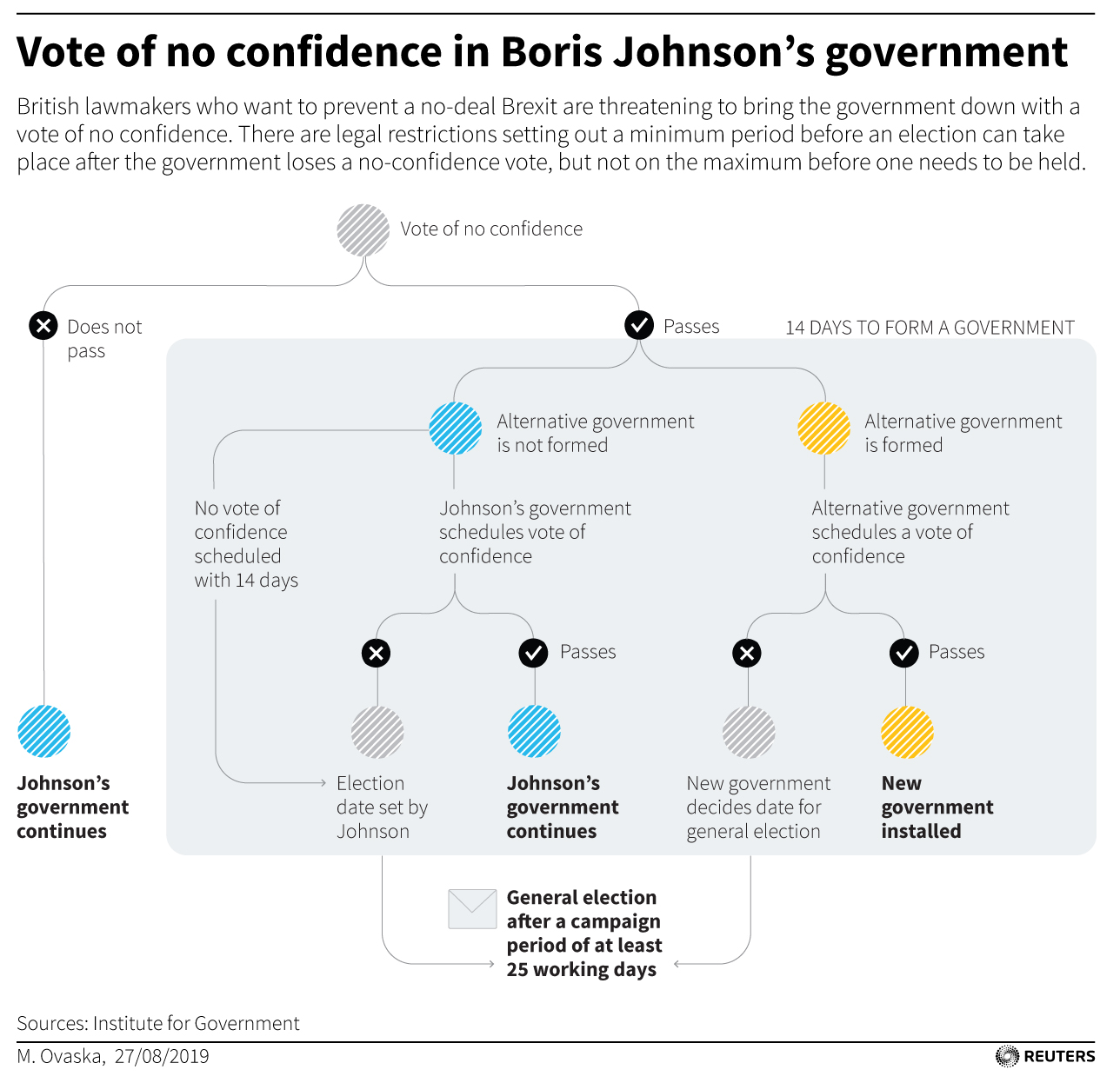
Prime Minister Boris Johnson implicitly warned lawmakers on Monday that he would seek an election if they tied his hands on Brexit, ruling out ever countenancing a further delay to Britain’s departure from the European Union.
Johnson’s promise to take the United Kingdom out of the European Union on Oct. 31 with or without a divorce deal has propelled the nation toward constitutional crisis and confrontation with the bloc’s 27 other members.
With less than 60 days before a possible no-deal exit, an alliance of opposition lawmakers are plotting with rebels in Johnson’s ruling Conservative Party to block that and force him to delay Brexit for three months.
But Johnson, who made his name as an EU-bashing journalist in Brussels before entering politics, said he would never do that, after his predecessor Theresa May twice postponed Brexit.
RELATED COVERAGE
- UK PM Johnson to seek Oct. 14 election if rebels block his Brexit plan: source
- UK’s Johnson says he doesn’t want election, calls for no more Brexit delay
See more stories
“I want everybody to know there are no circumstances in which I will ask Brussels to delay: we are leaving on 31st October, no ifs or buts,” Johnson said in a hastily-organized statement at a lectern outside Number 10 Downing Street.
“We will not accept any attempt to go back on our promises,” Johnson added. “I don’t want an election. You don’t want an election. Let’s get on with the people’s agenda.”
Britain’s Brexit dilemma is its most consequential political decision since World War Two.
Opponents of a no-deal exit say it would be a disaster for the economy, while Brexit supporters are eager to cut Britain free from what they see as a doomed experiment in integration that has seen Europe fall behind China and the United States.
Johnson, the face of the Vote Leave campaign in the 2016 referendum, said that if lawmakers voted to delay Brexit they would “plainly chop the legs out from under the UK position and make any further negotiation absolutely impossible”.
If parliament defeats the government on Brexit, a vote on holding an election will be held on Wednesday with an election date of Oct. 14, according to a senior government source.
(Graphic: Parliament’s active sitting days link: here)

(Graphic: Length of EU treaty debates in the UK link: here)Britain’s Prime Minister Boris Johnson addresses the media outside Downing Street in London, Britain, September 2, 2019. REUTERS/Henry Nicholls

(Graphic: Process of a no-confidence vote link: here)

(Graphic: Sterling positions link: here)
BIG STAKES
The intervention by Johnson was part of the high-stakes political chess game over Brexit ahead of parliament’s return from its summer break on Tuesday.
Rebels and opponents of the government say Johnson is betting on an election that he will cast as being forced on him by opponents of Brexit in parliament.
Lawmakers opposed to a no-deal Brexit will seek on Tuesday to take control of parliamentary time on Wednesday to pass legislation which would force Johnson to seek a three-month delay to Brexit.
More than three years since the United Kingdom voted 52-48% to leave the EU, it is still unclear on what terms, or indeed whether, Brexit will take place.
After Johnson’s enforcers warned rebels they would be kicked out of the party if they defied him, speculation mounted he would call for an election just days before an EU summit due on Oct. 17-18.Slideshow (14 Images)
Under British law, two-thirds of lawmakers must support holding an early election, and Johnson is not certain to get that backing.
The United Kingdom has held a variety of extraordinary votes in recent years. In 2014, Scots rejected independence in a referendum; in 2015, then prime minister David Cameron won a surprise majority on a pledge to hold an EU referendum but lost the referendum the following year.
After winning the top job in the chaos following the referendum, May bet on a 2017 snap election but lost her majority. Johnson took over from May in July after she failed three times to get a Brexit deal through parliament.
NO-DEAL BREXIT CLOSER?
The default position is that Britain will leave on Oct. 31 without a deal unless a divorce agreement is struck with the bloc and ratified by the British parliament or legislation is passed to delay or revoke the departure notice.
J.P. Morgan said in a research note it believed Monday’s developments made a no-deal more likely as it increased the chances of an election and opinion polls suggest Johnson could win an election campaigning for a no-deal mandate.
Johnson, 55, has cast rebels as EU “collaborators” who are undermining the government’s negotiating hand in seeking a withdrawal agreement by blunting his threat of a no-deal Brexit.
“Their (the government’s) strategy, to be honest, is to lose this week and then seek a general election,” said David Gauke, a former justice minister who is one of the rebel Conservative lawmakers.
Johnson has a working majority of just one seat in the 650-seat lower house of parliament and British media suggested about 20 Conservative lawmakers were prepared to rebel against him.
An election would open up three main options: a Brexit-supporting government under Johnson, a Labour government led by veteran socialist Jeremy Corbyn or a hung parliament that could lead to a coalition or minority government of some kind.
Writing by Guy Faulconbridge; Editing by Michael Holden and Andrew Cawthorne
LONDON (Reuters) –
